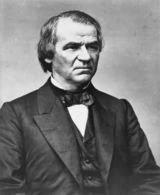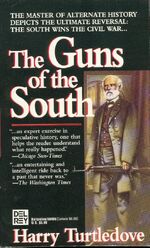| Andrew Johnson | |

| |
| Historical Figure | |
| Nationality: | United States |
| Year of Birth: | 1808 |
| Year of Death: | 1875 |
| Cause of Death: | Stroke |
| Religion: | Christianity (no particular denomination) |
| Occupation: | Tailor, Politician |
| Spouse: | Eliza Johnson |
| Children: | Five |
| Political Party: | Democratic Party (1829-1864; 1869-1875) National Union Party (1864-1869) |
| Political Office(s): | United States Representative from Tennessee, Governor of Tennessee (1853-57), United States Senator from Tennessee, Military Governor of Tennessee, Vice President of the United States (March-April, 1865), President of the United States (1865-9) |
| Fictional Appearances: | |
Andrew Johnson (December 29, 1808 – July 31, 1875) was the 17th President of the United States (1865-9), succeeding to the Presidency upon the assassination of Abraham Lincoln. He is one of only three U.S. Presidents to be impeached, the other ones being Bill Clinton and Donald Trump. He is also the only former President to serve as a Senator after his presidency, which he did from March 1875 until his death later that year.
Johnson served as a United States Senator from Tennessee at the beginning of the American Civil War. He was the only Southern Senator not to quit his post upon secession, and became the most prominent War Democrat from the South. In 1862 President Lincoln appointed Johnson provisional governor of Tennessee, where he proved energetic and effective in fighting the rebellion. In 1864, the Republican Lincoln sought reelection, and crafted a National Unity ticket. Johnson, a War Democrat, was nominated for the Vice President slot, displacing incumbent Vice President Hannibal Hamlin. The ticket won easily. Six weeks after their inauguration in March, 1865, John Wilkes Booth assassinated Lincoln, and Johnson ascended to the presidency. Johnson himself had been a target of Booth's plan, but his would-be assassin, George Atzerodt, got drunk instead.
Johnson's term was a series of conflicts between himself and the Republican Congress over the course of Reconstruction of the vanquished South. Johnson routinely bowed to the South's efforts to restrict the freedmen and reassert its antebellum influence in the Federal government. The Congress conversely passed legislation designed to undermine Johnson's efforts and counteract Southern policies. Johnson would veto such legislation, and Congress handily overrode Johnson's vetoes. In 1866, Johnson went on an unprecedented national tour promoting his executive policies, seeking to destroy his Republican opponents. As the conflict between the branches of government grew, Congress passed the Tenure of Office Act, restricting Johnson's ability to fire Cabinet officials (a law that was probably unconstitutional). When he persisted in trying to dismiss Secretary of War Edwin M. Stanton, he was impeached by the House of Representatives, and narrowly avoided conviction in the Senate and removal from office. After failing to win the 1868 Democratic presidential nomination, Johnson left office in 1869. He briefly launched a second act of his political career, winning election to the U.S. Senate in 1875, but he died a few months into his term.
Andrew Johnson in "Must and Shall"[]
| "Must and Shall" POD: July 12, 1864 | |
| Type of Appearance: | Direct |
When Abraham Lincoln was killed by a Confederate sharpshooter at Fort Stevens on July 12, 1864, Hannibal Hamlin became President, and Andrew Johnson,[1] whom Lincoln had chosen to replace Hamlin as Vice President, was sidelined. On July 21, Johnson could do nothing but glare up from the audience as Hamlin was inaugurated.[2]
Andrew Johnson in The Guns of the South[]
| The Guns of the South POD: January 17, 1864 | |
| Type of Appearance: | Contemporary reference |
| Political Party: | Radical Republicans (1864) |
| Political Office(s): | Military Governor of Tennessee |
Tennessee politician Andrew Johnson became the vice-presidential candidate of the breakaway "Radical Republicans" in 1864, running with John C. Frémont. The Frémont-Johnson ticket came third in the popular vote but last in the electoral college. They received 436,337 popular votes and only three electoral votes from Kansas.[3]
See Also[]
- References to Historical Figures in Turtledove's Work, for more minor references to Johnson in Turtledove's work.
- Hannibal Hamlin, Abraham Lincoln's first Vice President in OTL, who in "Must and Shall" becomes the 17th President of the United States instead of Johnson.
- Horatio Seymour who in The Guns of the South is elected 17th President of the United States in 1864.
- Clement Vallandigham, who in The Guns of the South is elected the 16th US Vice President.
- Bill Clinton, the second US President impeached in OTL.
- Donald Trump, the third US President impeached in OTL.
- John Nance Garner, 32nd Vice President in OTL, who in Joe Steele becomes the 33rd President on the death of Joe Steele and is subsequently impeached. Unlike Johnson, Garner is convicted and removed from office.
References[]
- ↑ See Inconsistencies (Must and Shall).
- ↑ See, e.g., Counting Up, Counting Down, pg. 56, pb.
- ↑ The Guns of the South, pg. 249, pb, also appendices.
| Titles and Succession | ||||||||||||||||||||||||||||||||||||
|---|---|---|---|---|---|---|---|---|---|---|---|---|---|---|---|---|---|---|---|---|---|---|---|---|---|---|---|---|---|---|---|---|---|---|---|---|
| ||||||||||||||||||||||||||||||||||||


